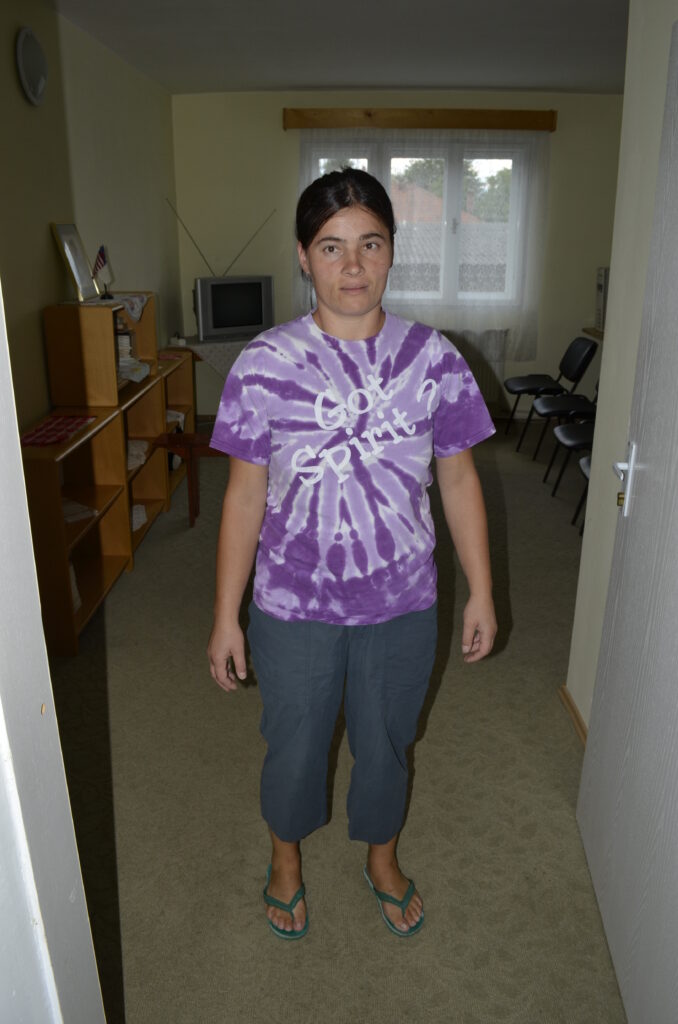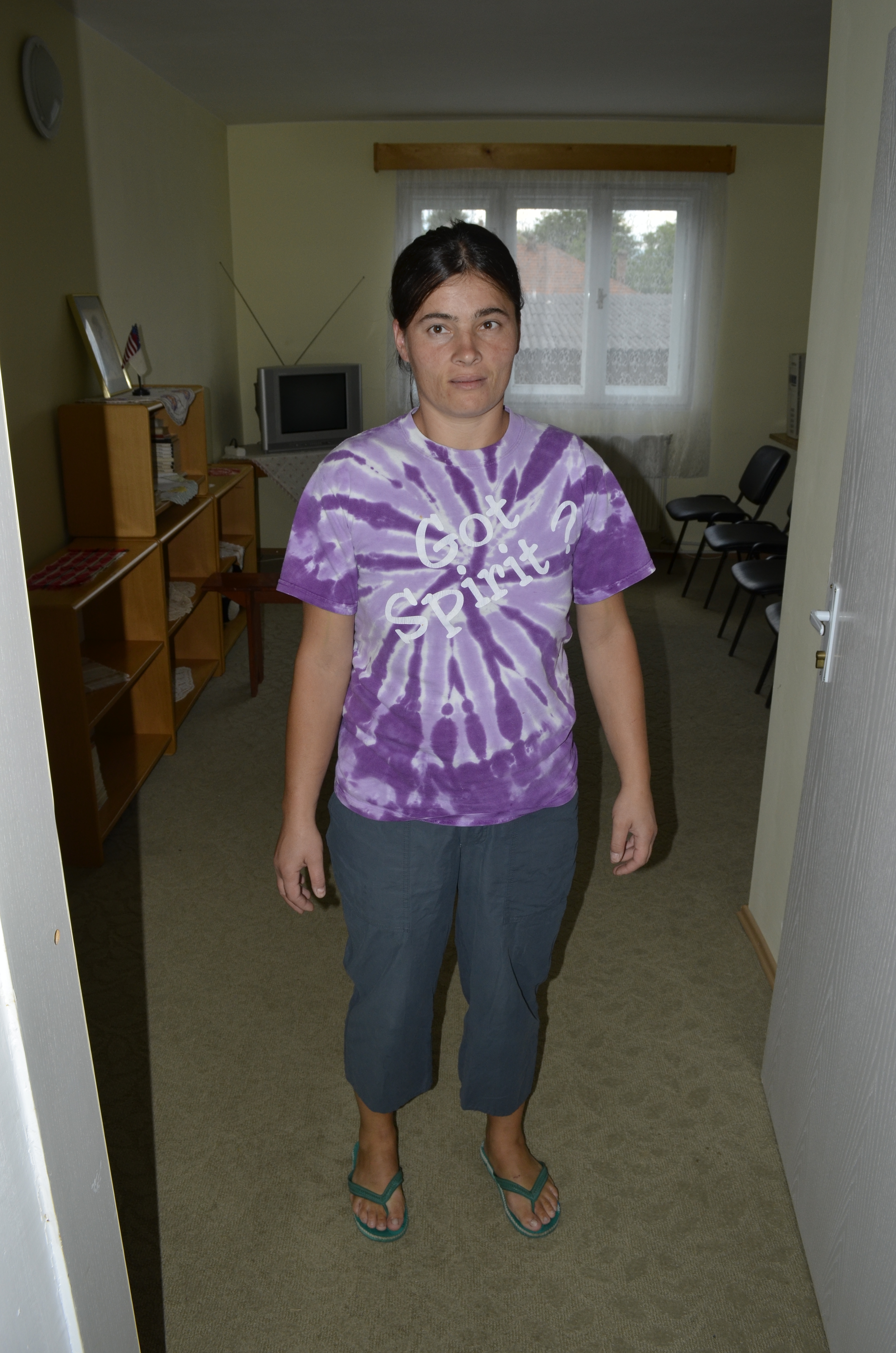
Oana Bucătaru, ultima persoană recuperată din canale de regretatul pastor Dugulescu
Oana s-a integrat foarte bine la Casa “Betania”. Este foarte harnică şi se implică în treburile gospodăreşti. Se grăbeşte să-şi termine curăţenia de la bucătărie ca să aibă timp să joace table şi să-mi împărtăşească câteva gânduri.
De-a lungul vieţii, Oana a avut de înfruntat numeroase greutăţi. Şi-a petrecut cei mai mulţi ani în centrele de plasament din Iaşi, iar după vârsta de 18 ani a trăit o viaţă zbuciumată pe stradă şi a locuit în canal.
Dumnezeu s-a îndurat de ea şi a ajuns la Casa “Betania” din Haţeg, dar şi aici, Oana s-a acomodat destul de greu, fiindcă nu a fost obişnuită să respecte regulile necesare pentru a trăi în societate. Zilnic, ea face eforturi, susţinută fiind de personalul de la Casa “Betania”, ca să înveţe ce înseamnă să locuieşti într-o casă, alături de alte persoane.
Deşi are doar 33 de ani, pe faţa ei se observă că timpul a lăsat urme adânci. Ea a înfruntat multe necazuri şi este complexată pentru că a fost privată de dragostea părintească. Necazurile şi anturajul în care a trăit a determinat-o să fie agresivă şi chiar violentă. A fost internată şi la un spital de psihiatrie, unde spune că era deseori bătută sau legată ca să se liniştească…”Dacă râdeam foarte mult sau nu ascultam, asistentele ne făceau injecţii ca să dormim. Alteori ne băteau…Pentru mine era mai bine să traiesc pe stradă decât în spital…”, spune Oana
În perioada în care a trăit pe stradă, Oana s-a drogat foarte mulţi ani. “Mă drogam cu bronz, cu prelandez la sticlă mică. Turnam în pungă şi trăgeam. Pluteam şi nu mai trebuia să mănânc. Ne spălam de două ori pe săptămână la o baie comunală. Uneori mai mâncam la cantina socială. E tare rău pe stradă! Trebuie să cauţi loc ca să ai unde să dormi. Un timp am dormit în scara unui bloc până ne-au gonit vecinii. Vara dormeam afară pe iarbă. Luam câte două căciuli ca să nu mă doară capul. Iarna dormeam într-un chioşc de ziare”, spune Oana.
Înainte de a ajunge la Haţeg, Oana a lucrat la o societate de confecţii din Iaşi. “Din salariu îmi cumpăram câte 10 sprayuri ca să am mai multe decât celelalte fete de pe stradă. Mi-am făcut şi rată pentru celular ca să fiu interesantă. Nu a avut cine să mă înveţe ce trebuie să fac cu banii”.
Oana este recunoscătoare că s-a întâlnit cu preşedintele Asociaţiei Isus Speranţa României, Petru Dugulescu, care a decis să o primească la Casa Betania din Haţeg. De atunci au trecut trei ani, timp în care Oana s-a schimbat. Chiar a fost felicitată de conducerea Casei Betania pentru comportamentul ei. S-a liniştit şi a învăţat să respecte oamenii. Oana merge săptămânal la întâlnirile de tineret de la biserica Baptistă din Haţeg şi este nelipsită de la serviciile divine. « M-am schimbat foarte mult de când am venit la Haţeg. Am făcut şi tratament şi e mai bine. La vară vreau sa-mi vizitez o prietenă la Moldova care vine acasă în concediu. Când am stat la Iaşi, eu am avut grijă de fetiţa ei care a fost bolnavă. Dacă mă uit în urmă, la viaţa mea, pot să spun că cel mai bine îmi este de când am venit la Betania. Aici ajut la treabă. Vreau să stau aici cât o fi…”, încheie Oana.
BUCATARU OANA, 28 years old All her life, Oana had to encounter numerous hardships. She spent most of her years in placement centers in Iaşi. After her 18th birthday, she faced turmoil and unrest, living on the streets and in the gutters. God had mercy on her and she ended up in “Bethany House” in Haţeg, but even here, Oana had a hard time accommodating, as she wasn’t used to respect the rules required to live in society. She makes daily efforts, helped by the personnel at “Bethany House”, to learn what living in a house with other people means. Although she is only 28 years old, you can see that time has left deep marks on her face. She faced numerous troubles adapting, as she has been deprived of the parent’s love. Her troubles and the entourage that she lived in determined her to be aggressive and even violent. She was confined to a psychiatric hospital where she tells us that she was often beaten or tied up in order for her to calm down. “If I laughed too much or didn’t listen to them, the nurses would give us injections for us to sleep. Sometimes they used to beat us. It was better for me to live on the streets that in the hospital…” Oana tells us. Drugs and … deodorants During the time she used to live on the streets, Oana got herself drugged for many years. “I used to get high with bronze, with glue in small bottles. I poured in a bag and used to sniff it. I felt like I was floating and I didn’t even need to eat. We washed ourselves twice a week in a public washroom. Sometimes we used to eat in the social canteen. It is very hard living on the streets! You have to look up for a place to sleep. For a while I slept on the staircase of a flat, until the people who lived there found us and chased us away. During summer time we slept outside on the grass. We took two winter caps, so that our heads won’t hurt anymore. During winter, we slept in a deserted news stand” says Oana. Before coming to Hateg, Oana worked in a confection’s firm in Iaşi. “From my paycheck I used to buy 10 deodorants, so that I had more than the other girls on the street. I also got a credit for my cell phone so that I could be more interesting. I had no one to teach me what to do with my money.” Now, Oana is grateful that she met with the President of the Jesus the Hope of Romania Association, Peter Dugulescu, who decided to accept her in Haţeg. “I cried a lot in the beginning, but I know I have nowhere to go if I leave this place. I do kitchen work, but I would like to get a job, as you never know what can happen.”


